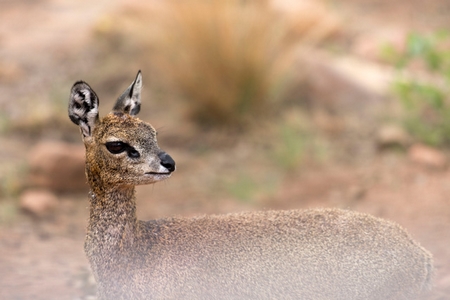The klipspringer is a unique, small antelope whose name is derived from Afrikaans, meaning ‘rock jumper.’ As the name suggests, these little creatures are perfectly adapted to a mountainous lifestyle and thrive in rocky habitats. Incredibly agile, they can move swiftly across rocky outcrops, hillsides, and steep ledges. Because they are so fast and nimble, klipspringers cover distances quickly and, when chased by a predator, may stop occasionally to determine where the predator is. To warn others, they give loud nasal whistles while fleeing from disturbances.
Living on the Edge: Klipspringer’s Survival Tactics
Standing only 50–60 cm in height, klipspringers are small enough to be preyed upon by a wide range of larger animals, including leopards, hyenas, baboons, and big birds of prey. They are usually found in pairs or small family groups. The adult ram is territorial, marking areas with dung middens and glandular secretions from the pre-orbital gland. This gland, located in front of the eye, appears as two big, dark blotches and is used to mark twigs and branches, conveying information to other klipspringers. Ewes also mark territory, but not as frequently as the males.
Unique Adaptations: The Klipspringer’s Coat and Camouflage
Klipspringers have a grizzled appearance due to the structure of their hair, which is quite different from most other antelope. Their yellowish-grey coat provides excellent camouflage against rocky backgrounds and is coarse and thick, with hollow, brittle hairs. This unique coat helps them withstand cold winds on rocky mountainsides and prevents potential skin damage as they sprint around boulders with the agility that only klipspringers possess.




